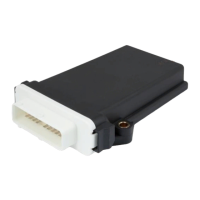7 Teleservice Application Framework
User Manual 143/374
7.3.3.9 dbus_call_signal
Function Description
sint32 dbus_call_signal (const T_DBUS_Util * const opt_DBusInstance, const charn * const
opcn_DBusTarget, const charn * const opcn_SignalName, const charn * const
opcn_SignalArgument);
This generic D-Bus utility function creates a signal call on the D-Bus with one string argument.
Information Flow
Input Information
holds all D-Bus information
contains target on D-Bus e.g." ysysd"
maximum the name length we
expect to call
pointer to the signal from target e.g.
"GetGSMMode"
maximum the name length we
expect to call
pointer to the signal argument e.g. "12345"
Structure T_DBUS_Util
typedef struct
{
DBusConnection* pt_dbus_conn; // D-BUS connection instance
charn acn_myNameString[128]; // Name of the application, Don't use any
special
// characters, white spaces or new lines!
charn acn_myVersion[128]; // Additional value (for HELLO) signal (opt.)
charn acn_myStatus[128]; // Additional value (for HELLO) signal (opt.)
charn acn_myAddInfo[512]; // Additional value (for HELLO) signal (opt.)
sint32 s32_myTriginterval; // Time interval when the ysysd
// expects to be triggered
charn acn_myCMDOnWatchdog[2048]; // Bash cmd that must be executed
// by the ysysd in case no
// trigger signal occurred in time.
} T_DBUS_Util;
Output Information
Function executed without error.
This function is used from TAF internal functions and it is not recommended to use it from user
applications. Use the corresponding daemon functions.

